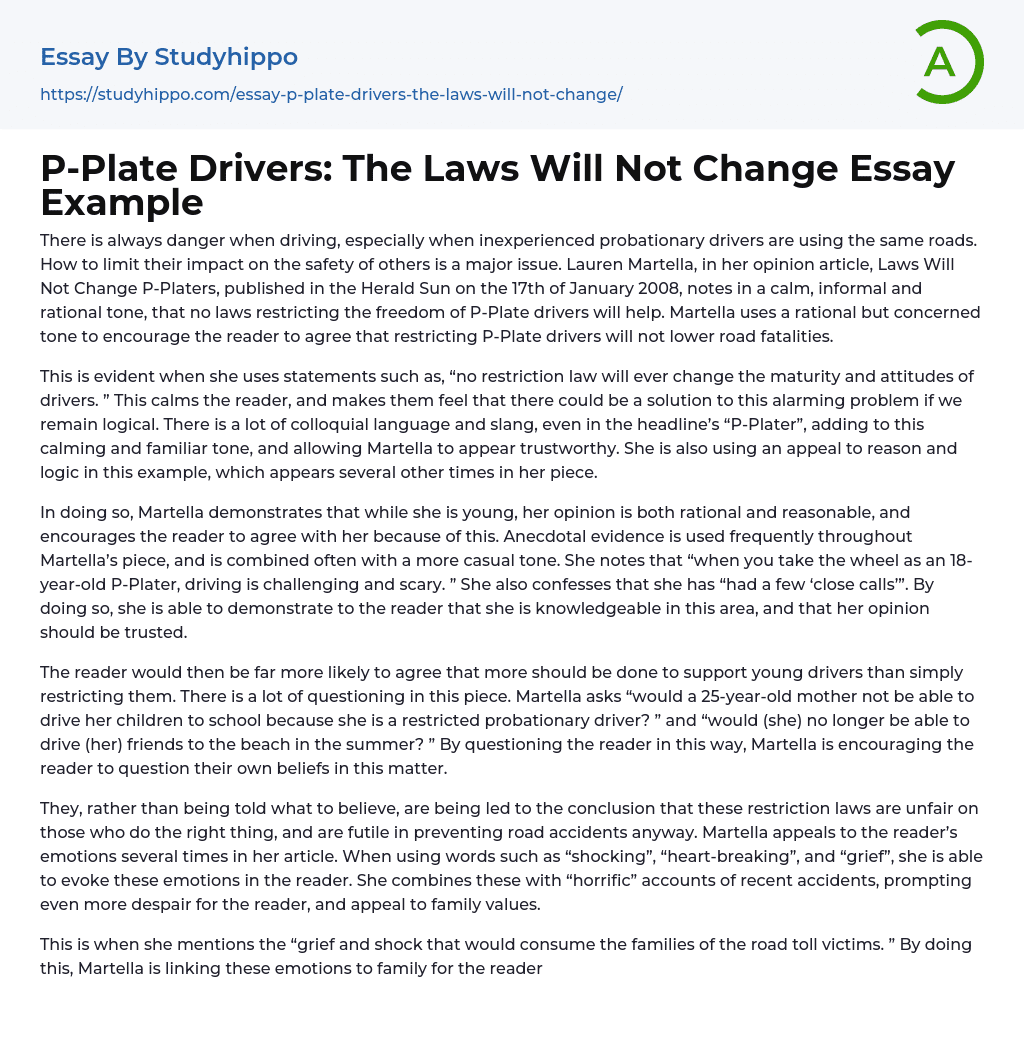There is always danger when driving, especially when inexperienced probationary drivers are using the same roads. How to limit their impact on the safety of others is a major issue. Lauren Martella, in her opinion article, Laws Will Not Change P-Platers, published in the Herald Sun on the 17th of January 2008, notes in a calm, informal and rational tone, that no laws restricting the freedom of P-Plate drivers will help. Martella uses a rational but concerned tone to encourage the reader to agree that restricting P-Plate drivers will not lower road fatalities.
This is evident when she uses statements such as, “no restriction law will ever change the maturity and attitudes of drivers. ” This calms the reader, and makes them feel that there could be a solution to this alarming problem
...if we remain logical. There is a lot of colloquial language and slang, even in the headline’s “P-Plater”, adding to this calming and familiar tone, and allowing Martella to appear trustworthy. She is also using an appeal to reason and logic in this example, which appears several other times in her piece.
In doing so, Martella demonstrates that while she is young, her opinion is both rational and reasonable, and encourages the reader to agree with her because of this. Anecdotal evidence is used frequently throughout Martella’s piece, and is combined often with a more casual tone. She notes that “when you take the wheel as an 18-year-old P-Plater, driving is challenging and scary. ” She also confesses that she has “had a few ‘close calls’”. By doing so, she is able to demonstrate to the reader tha
she is knowledgeable in this area, and that her opinion should be trusted.
The reader would then be far more likely to agree that more should be done to support young drivers than simply restricting them. There is a lot of questioning in this piece. Martella asks “would a 25-year-old mother not be able to drive her children to school because she is a restricted probationary driver? ” and “would (she) no longer be able to drive (her) friends to the beach in the summer? ” By questioning the reader in this way, Martella is encouraging the reader to question their own beliefs in this matter.
They, rather than being told what to believe, are being led to the conclusion that these restriction laws are unfair on those who do the right thing, and are futile in preventing road accidents anyway. Martella appeals to the reader’s emotions several times in her article. When using words such as “shocking”, “heart-breaking”, and “grief”, she is able to evoke these emotions in the reader. She combines these with “horrific” accounts of recent accidents, prompting even more despair for the reader, and appeal to family values.
This is when she mentions the “grief and shock that would consume the families of the road toll victims. ” By doing this, Martella is linking these emotions to family for the reader, and creating a sense of fear for loved ones. The photograph of a woman kneeling down in grief in front of a memorial targets these same feelings. The reader is forced to think about what it would be like to be in their position, and to lose
a friend or family member in this way. By using so many appeals to the reader’s emotions, Martella is able to create the impression that this is a problem that affects everyone in a hugely emotional way.
Her calm, rational tone is effective here also, as the reader is encouraged to feel that there is a way to combat these tragic circumstances, and these must be dealt with before more devastation can occur. Lauren Martella’s Laws Will Not Change P-Platers makes use of several persuasive techniques such as appeals to reason, anecdotes, questioning, emotive language, and the use of an emotive photograph. These are combined with a rational, conversational tone in order to convince the reader that legislation restricting P-Plate drivers is not enough to save them from themselves.
- Pressure essays
- Confidence essays
- Disgrace essays
- Lost essays
- Harmony essays
- Fairness essays
- Sarcasm essays
- Respect essays
- Responsibility essays
- Empathy essays
- Suffering essays
- Suspense essays
- Fear essays
- Feeling essays
- Loneliness essays
- Ambition essays
- Tolerance essays
- Hope essays
- Inspiration essays
- Kindness essays
- Shame essays
- Desire essays
- Doubt essays
- Grief essays
- Hate essays
- Laughter essays
- Passion essays
- Pride essays
- Forgiveness essays
- Happiness essays
- Humanity essays
- Loyalty essays
- Guilt essays
- Honesty essays
- Betrayal essays
- Need essays
- Boredom essays
- Courage essays
- Regret essays
- Anger essays
- Honor essays
- Honesty Is The Best Policy essays
- Business Law essays
- Contract essays
- Consumer Protection essays
- Property essays
- Ownership essays
- Agreement essays
- Common Law essays
- Contract Law essays




